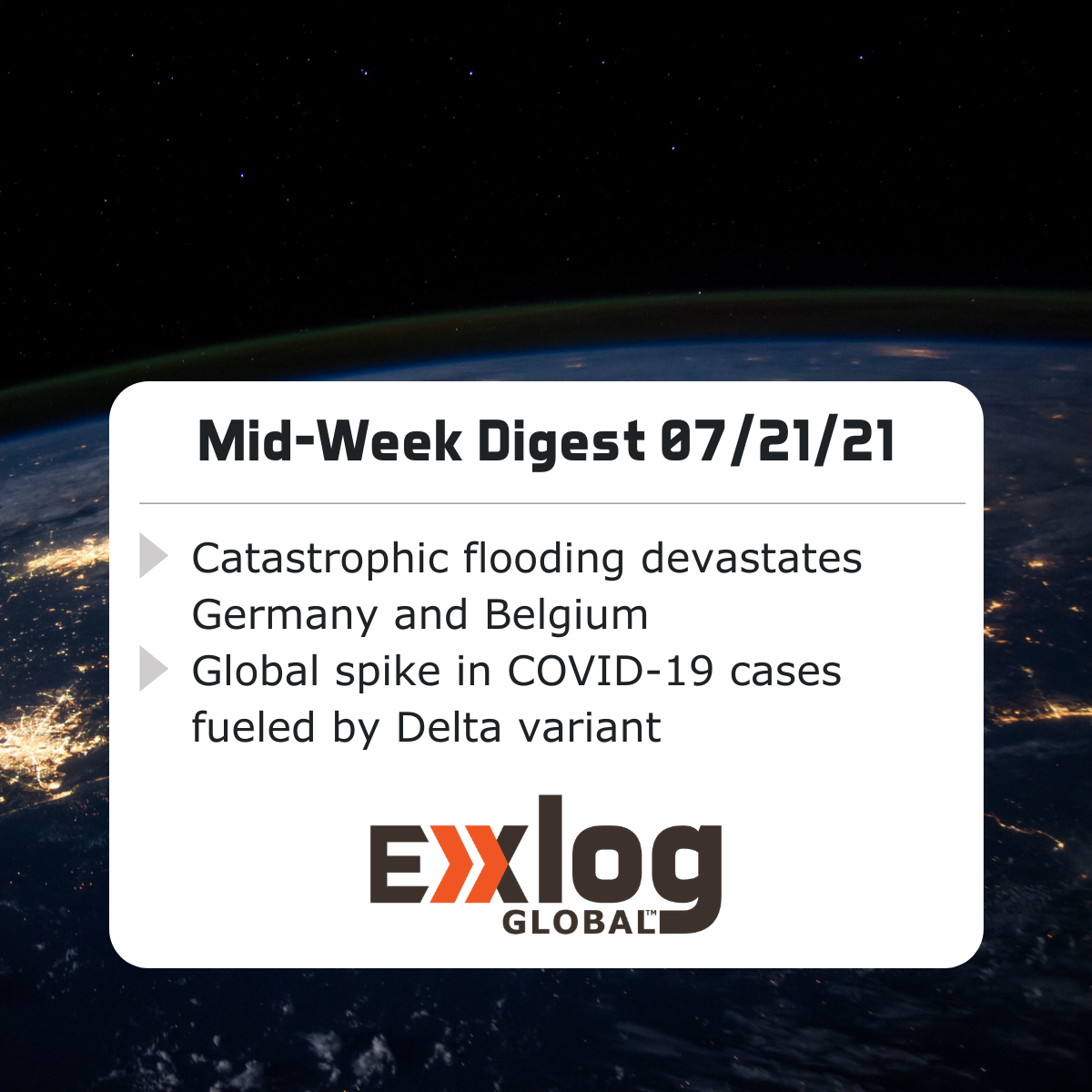Catastrophic flooding devastates Germany and Belgium and Global spike in COVID-19 cases fueled by Delta variant
Western Europe: Catastrophic flooding devastates Germany and Belgium
Devastating flooding caused by heavy rainfall left at least 195 people dead and displaced tens of thousands in western Europe between July 15-16; hundreds remain missing. European meteorologists claimed the storm made rivers rise to levels not seen in nearly 1,000 years. Germany’s three western states – North Rhine-Westphalia, Rhineland-Palatinate and Saarland – and Wallonia state in Belgium witnessed the most destruction due to the flooding, while neighboring Netherlands and Luxembourg were affected by heavy downpours. Several southern areas in the Netherlands were evacuated after the river Mass rose to record levels on July 17.
In Germany, the catastrophe quickly became politicized ahead of the September 26 election, with federal government officials defending the national alerting system and blaming local authorities for failing to clearly communicate and warn their residents in a timely manner. Armin Laschet, a representative from North Rhine-Westphalia, who is a hopeful successor to Angela Merkel and is competing against the environmentalist Green Party, pointed out the need for making the state “climate-proof,” announcing his intent to make Germany climate neutral “even faster”. Infrastructure damage has complicated rescue and communication efforts. Phone and power lines were down, and water supply to the affected regions will likely remain disrupted in the short term. According to Germany’s transport minister, 20 out of 35 bridges along the River Ahr were destroyed. Germany’s train company Deutsche Bahn said 80 train stations were closed and at least 12 lines were out of service, as of July 18. While it is too early to accurately estimate the cost of overall losses and damages, media reports have indicated the floods will likely cost the insurance industry between $2-3 billion.
Worldwide: “Pandemic of the unvaccinated” – Global spike in COVID-19 cases fueled by Delta variant
A recent surge in COVID-19 cases across the world validates expert predictions of outbreaks in regions with low vaccination rates, underscoring their warnings that a global inoculation campaign is the most effective way to mitigate the impacts of the pandemic. This upward trend is resulting in renewed lockdowns and threatens economic recovery in impacted regions. The Delta variant continues to spread globally and may soon become the dominant strain worldwide, according to the World Health Organization (WHO). European authorities claimed the Delta variant would account for 90 percent of cases in the European Union by the end of August. Three out of six Australian states are under lockdown due to the highly transmissible Delta variant; only 14 percent of Australians have been fully vaccinated. In the US, the average of new daily case rate has increased by 66 percent this week; the CDC attributed more than 83 percent of the new infections to the Delta variant. The new cases have been concentrated in areas with low vaccination rates, and unvaccinated patients account for 97% of all COVID-19-related hospitalizations.
The spread of the variant has raised concerns about US economic recovery – investors fear stagflation amid rising consumer prices and plummeting prices of stocks in the aviation, energy, and oil & gas industries. Delta has particularly affected developing countries where vaccination rates are much lower, notably in Indonesia and South Africa. In both countries, less than 7% of the population are inoculated, and Delta has been identified in 95-99% of new infections. Much of the African continent has recorded a similar trend – the WHO reported a 43 percent increase in COVID-19-related deaths between July 11-17. Following the global upsurge in cases related to the Delta variant, Israel authorized a third dose of the BioNTech/Pfizer vaccine to immunocompromised adults, becoming the first country to offer boosters. Other counties could follow Israel’s example, which triggers a debate of vaccine supply ethics, considering some developing countries are yet to vaccinate healthcare workers and the most vulnerable population groups.


